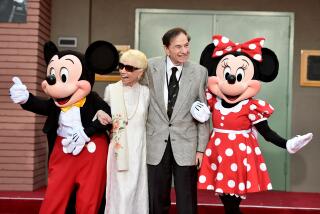In the Shadow of Frank Sinatra
- Share via
It was probably inevitable that Frank Sinatra’s three children would follow him into show business, given their father’s prominence and the entertainment world’s fascination with dynasties.
Nancy, 57; Frank Jr., 54; and Tina, 49, are all the product of Sinatra’s marriage to Nancy Barbato, which essentially lasted through the 1940s. Nancy and Frank Jr. pursued careers as singers from the very beginning; Tina briefly flirted with the entertainment world as an actress before moving to the business side of the industry.
Despite their varying ambitions, the fate of the Sinatra children--like the fates of other offspring of legendary performers--was to function in the shadow of their charismatic parent. And Frank Jr., whose performing skills most closely approached those of Frank Sr., was the offspring most directly eclipsed by his father.
Frank Jr.’s own budding vocal career was dramatically impacted in 1963 when, just before he turned 20, he was kidnapped and held for ransom. Although the ransom was paid, he was safely released and the kidnappers caught and convicted, there was a prevailing opinion in the press that the whole thing had been a publicity stunt.
Reacting sarcastically to the doubters, Frank Sinatra Sr. reportedly noted at the time, “This family needs publicity like it needs peritonitis.”
Even so, the fallout from the event hung over Frank Jr.’s career for decades.
In a small gesture of self-identity, Frank Jr. always has been quick to point out that he really isn’t a junior--his full name is Franklin Wayne Sinatra. But the similarities are immediately apparent. The face may be a little more moon-shaped than the classic, gaunt look of the elder Sinatra (at least in his younger years), but the ineffable Sinatra sound is almost uncannily similar. When his father’s television biography (produced by Tina Sinatra) was produced in 1992, Frank Jr. was called upon to provide additional vocal tracks for scenes placed in Sinatra’s youth.
Even beyond the familiar Sinatra sound and similarly easygoing way with rhythm and phrasing, however, there are further likenesses. Frank Jr.’s style, manner, even his speech, have a Sinatra-like quality. And, despite his more logical association with the boomer generation, he banters easily about his father’s late associates--Dean Martin, Sammy Davis Jr., Peter Lawford--and about the escapades of the Rat Pack.
Ironically, critics have easily accepted the fact that singers such as Steve Lawrence, Jack Jones and others were heavily influenced by Sinatra. But until very recently, when Sinatra Jr. has fronted his own, jazz-tinged band, they have seemed less accepting of the son’s legitimately earned, even inherited, version of his father’s music.
“I’m very happy to have people say I sound like Frank Sinatra,” he said. “There’s one important distinction I make, though. It’s OK if people say I sound like Frank Sinatra. I just don’t want them to think I am Frank Sinatra.
“But don’t you think that Noel Blanc is happy that his father [Mel Blanc, the famous animated voice actor] taught him how to do the voices of Bugs Bunny and all those other characters? I mean, Frank Sinatra is one of the great performers in pop music history. Why shouldn’t I be delighted to carry on his tradition?”
In fact, Sinatra Jr. has done considerably more than “carry on his tradition.” For the latter years of his father’s active performing career, the younger Sinatra served as his musical conductor, leading the orchestra, cuing him, exerting careful control over every aspect of his appearances. Watching the interaction between the two in performance was a fascinating experience, a touching display of a son’s love for his father. Whenever the elder Sinatra missed a word or made a misstep, his son was always positioned--musically, verbally and emotionally--to provide immediate support.
“I do about 24 weeks a year with him,” he said at the time the elder Sinatra was still actively performing. In order to do so, Sinatra Jr. placed his own career “in between the cracks.”
Asked why he accepted a diminished career of his own in order to create a safe musical environment for his father, he simply replied, “Because he needs me.”
*
Nancy Sinatra, Sinatra’s eldest child, struck out on her own in the ‘60s, singing in a frothy pop rock style that was the antithesis of her father’s music. Her ‘60s image, resplendent with pink miniskirts and boots, served her well during a few years of high success. Between 1966-67, she charted nine Top 40 tunes, including the giant hit “These Boots Were Made for Walking.”
But she was never really very far from her father’s orbit. Shortly after “Boots” in 1966, she sang the theme song for Sinatra’s movie “Tony Rome.” In 1967 she teamed up with her father for the offbeat No. 1 hit “Somethin’ Stupid.”
After drifting away from show business for years, she came back with a bang in 1995 when she released “One More Time,” her first album in 15 years, and, at 54, posed for a Playboy pictorial.
“I wanted to strike a blow for middle-aged women,” she told The Times. “A lot of people don’t think 50 is sexy, and that’s too bad, because there are a lot of baby boomers coming up right behind me.”
What did Sinatra Sr. think about her Playboy spread? According to columnist Liz Smith, he didn’t like it at all. “He gets grim whenever it’s mentioned,” Smith reported, “saying, ‘No father wants to see a daughter like that!’ ”
Sinatra’s youngest offspring, Tina, has been, of his three children, the least attracted to the entrancement of show business and, thereby, the least impacted by his career. So when Sinatra turned to her to produce his dramatized television biography--a project that had bounced around unsuccessfully for years--he clearly made a wise choice.
Six months old when Sinatra was separated from her mother, Nancy, Tina was 3 when they were divorced. Unlike her older siblings, she did not directly experience the Sinatras’ marital problems prior to their divorce. Nor did she follow their same quest for stardom, preferring--since her divorce in 1984--to remain in the business end of the entertainment world.
More to Read
The biggest entertainment stories
Get our big stories about Hollywood, film, television, music, arts, culture and more right in your inbox as soon as they publish.
You may occasionally receive promotional content from the Los Angeles Times.










